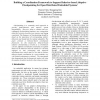Free Online Productivity Tools
i2Speak
i2Symbol
i2OCR
iTex2Img
iWeb2Print
iWeb2Shot
i2Type
iPdf2Split
iPdf2Merge
i2Bopomofo
i2Arabic
i2Style
i2Image
i2PDF
iLatex2Rtf
Sci2ools
120
Voted
HICSS
2007
IEEE
2007
IEEE
Building a Coordination Framework to Support Behavior-Based Adaptive Checkpointing for Open Distributed Embedded Systems
Checkpointing is a commonly used approach to provide fault-tolerance and improve system dependability. However, using a constant and preconfigured checkpointing frequency may compromise other QoS criteria when there are resource and timing constraints. The frequency of checkpointing should be based on the importance of corresponding entities’ behaviors and should also be runtime adaptable. The paper presents a behavior-based coordination framework. In this framework, behavior-based adaptive checkpointing is treated as a coordination concern; different coordination constraints are applied based on the behaviors that the entities are currently engaged in. Our prototyping and empirical experiments have shown that we are able to achieve behavior-based coordination in a more modular way with limited performance overhead. The experiments also demonstrate that the framework scales well when the number of entities involved in the system increases.
Behavior-based Coordination | Behavior-based Coordination Framework | Biometrics | HICSS 2007 | Preconfigured Checkpointing Frequency | System Sciences |
| Added | 02 Jun 2010 |
| Updated | 02 Jun 2010 |
| Type | Conference |
| Year | 2007 |
| Where | HICSS |
| Authors | Nianen Chen, Shangping Ren |
Comments (0)

